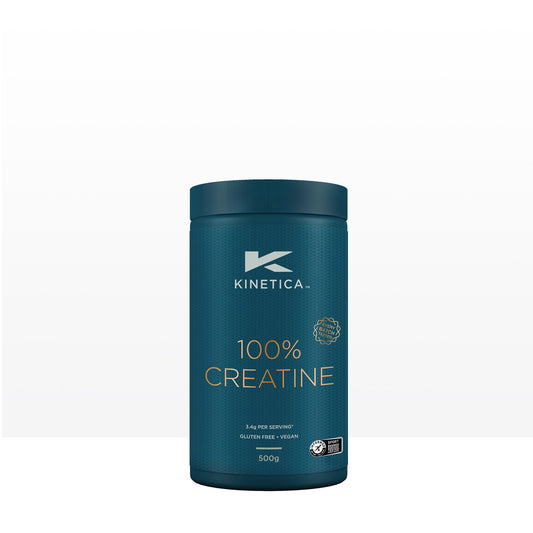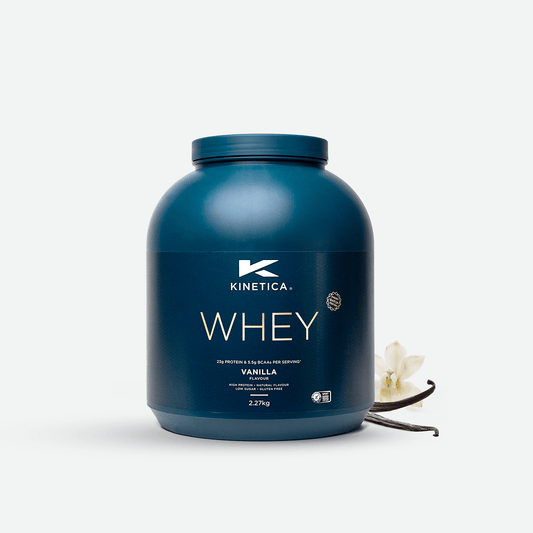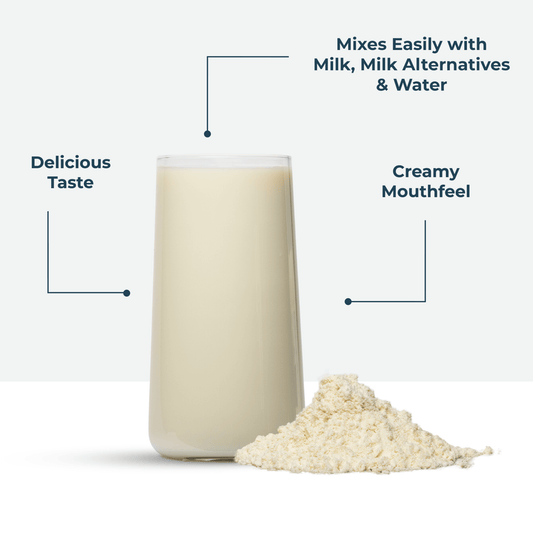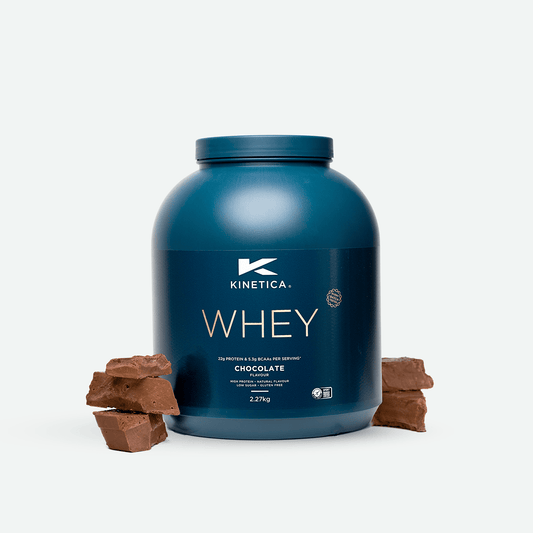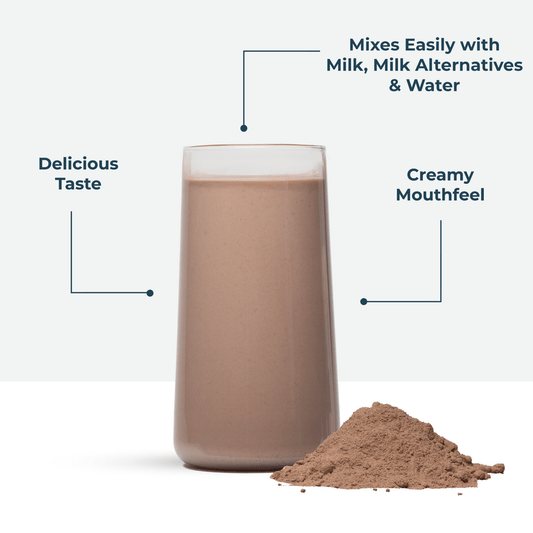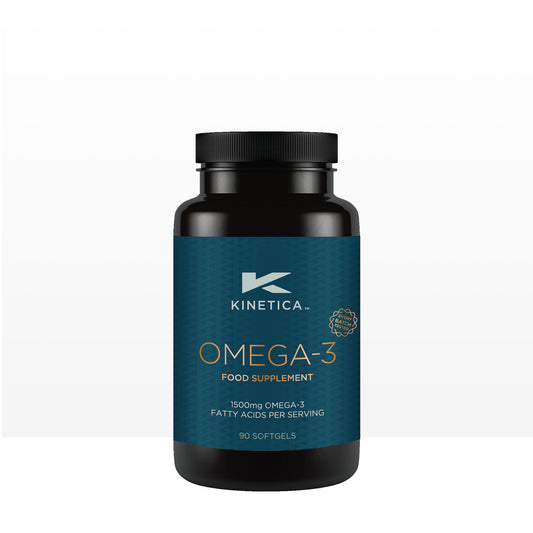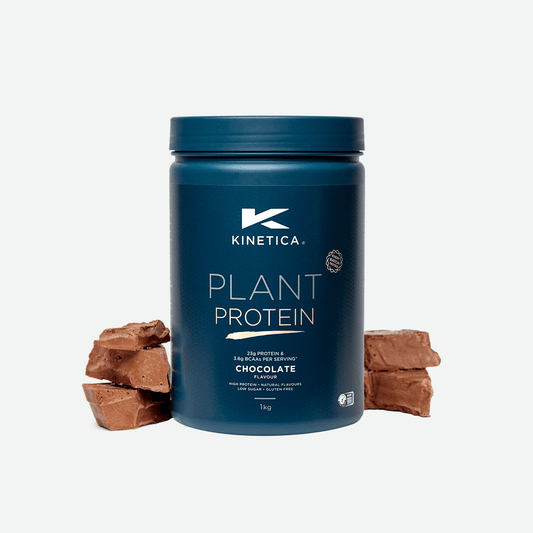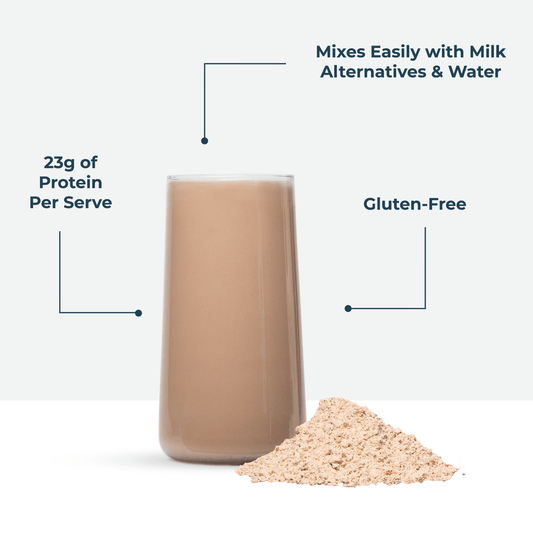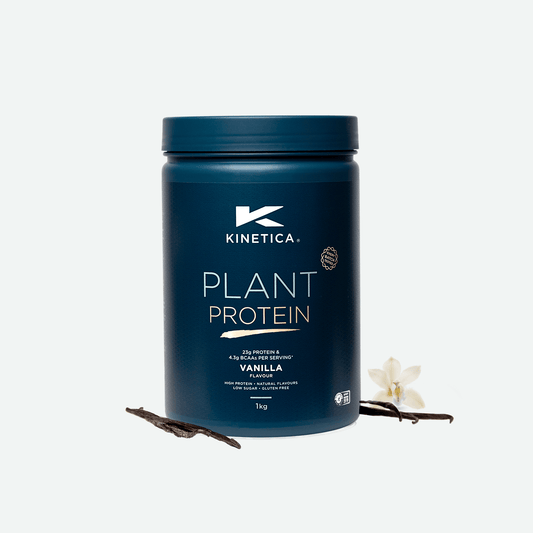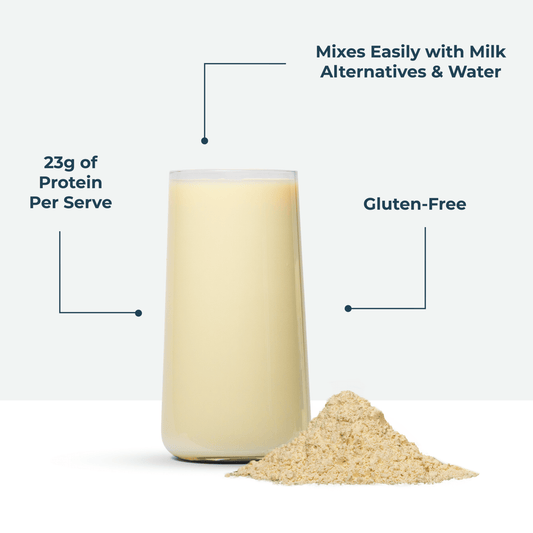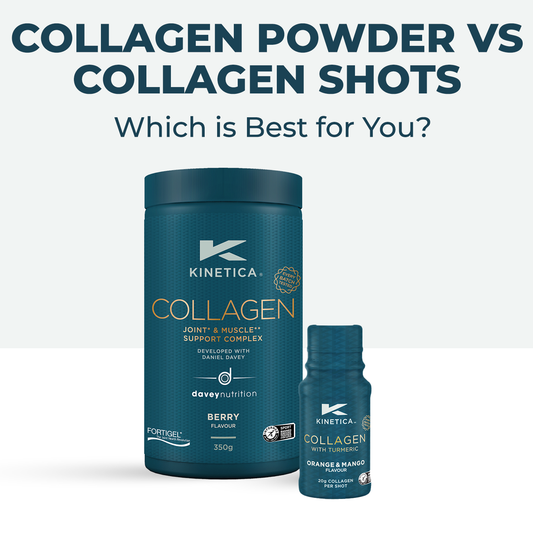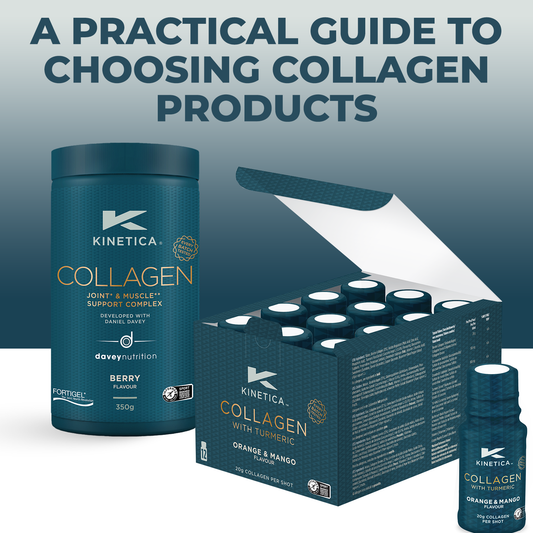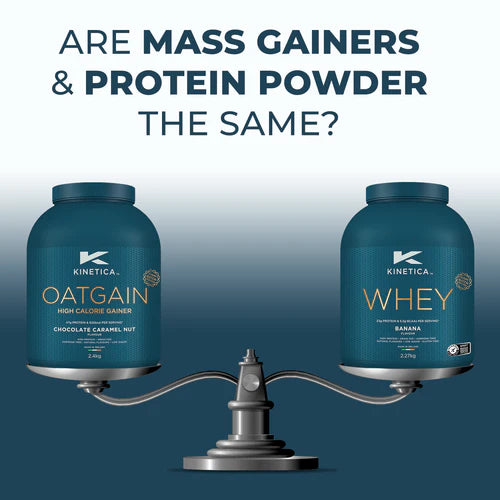Is Plant Protein Powder Better Than Whey Protein Powder?

In a marketplace saturated with nutritional supplements and nutraceutical aids, finding the right protein source to complement your training can feel like searching for a needle in a haystack. When it comes to protein powders, two types tend to take centre stage: Whey protein and Plant-based protein powders. Both have received much attention on social media and in the scientific literature. But how do they stack up against each other?
Whether you are instinctively Team Whey or Team Plant, this post will help you by answering the following questions:
- What is plant protein powder?
- What is whey protein?
- What are the differences between whey and plant protein powder?
- Is plant protein powder better for you than whey?
- Why choose Kinetica plant protein?
In this post, you will learn critical details that can help you choose between whey and plant protein, such as amino acid profiles, digestibility, bioavailability, allergies, environmental considerations and cost. We’ll also discuss which is better for goals like muscle gain, weight loss, and overall health. By understanding these factors, you can make an informed decision and make the right call for you. Ready to go? Let’s jump in.
Why Protein Matters
For the seasoned athlete, the business executive with a penchant for fitness, or the artist with a gruelling rehearsal schedule, understanding protein powders is more than just a bonus endeavour—it's about optimising health and performance.
Ensuring to consume enough protein every day is essential. There are countless reasons why protein is crucial for our body, but let's try to understand it from its most essential point of view. Whenever you eat protein from animals or plants, your digestive system breaks it down into amino acids that are utilised for a variety of functions within the body.
There are 20 amino acids. Out of these, nine are deemed essential – that is, our body has to consume them because they cannot be made internally by our physiology (Lopez and Mohiuddin 2023). These essential amino acids include:
- Phenylalanine
- Valine
- Tryptophan
- Threonine
- Isoleucine
- Methionine
- Histidine
- Leucine
- Lysine
The body is incredible. Out of these 20 amino acids, the body makes over 100,000 different proteins to keep you healthy – supporting immunity, balancing inflammation, making hormones and manufacturing neurotransmitters (Zhou, Xu et al. 2015, Gallo, Giansanti et al. 2022).
Think of amino acids as akin to materials and workers on a building site, constructing various proteins required by the body and signalling for certain things to happen to keep you at your best. In short, how you feel and perform is hugely determined by protein status in the body!
Take cysteine, another crucial amino acid for health. Cysteine is the rate-limiting amino acid for our internal production of glutathione (Kent, Harper and Bomser 2003). Glutathione is a powerful antioxidant that the body produces to protect us against free-radical damage from stress, exposure to pollution and daily life (Forman, Zhang and Rinna 2009).
With all that said, the next question is, where can you get the best sources of protein? Well, naturally, you always want to take a food-first approach rather than relying on supplementation. Choosing protein from organic, grass-fed, free-range, or wild sources is encouraged whenever possible. Excellent protein sources include lean meat, wild fish, eggs, tempeh, tofu, beans and pulses.
You might also be wondering how much protein you need. I have addressed this in other Kinetica blog posts, as the answer can depend on factors such as health, training status and activity levels (Phillips, Chevalier and Leidy 2016, Kerksick, Arent et al. 2017, Hector and Phillips 2018).
Recent evidence suggests that 1.2-1.6g/kg per day of protein for optimal health in adults (Phillips, Chevalier and Leidy 2016). For example, if you weigh 85kg, it would look like this:
- 85 x 1.2 = 102g of protein needed each day
- 85 x 1.6 = 136g of protein needed each day
To put this in context, a typical chicken breast might contain 25-30g of protein. With this in mind, hitting your protein needs could be challenging in the middle of a busy life. This is where whey and plant protein supplementation can really help.
1. What is a Plant Protein Powder?
Plant protein powders are derived from various plant sources. The most common sources include soy, peas, hemp, brown rice, and quinoa. These powders are often combined to form a complete protein—that is, a protein that contains all nine essential amino acids.
Here is a little more insight into some of these common types of plant protein powders:
- Soy Protein: Made from soybeans, containing all essential amino acids (Sui, Zhang and Jiang 2021).
- Pea Protein: Made in different forms like pea protein isolate, containing all essential amino acids (Lu, He et al. 2020).
- Rice Protein: Made in forms such as hydrolysed rice protein and is generally considered hypoallergenic (Dupont, Bocquet et al. 2020, Yang, Meng et al. 2023).
- Blends: Combine different plant proteins to improve the amino acid profile.
Plant protein powders are suitable for vegans, vegetarians, and those with lactose intolerance or milk allergies. They provide a nutrient-dense source of protein from plants without cholesterol or saturated fats. However, the protein content and quality can vary compared to animal-based proteins like whey or casein (Dupont, Bocquet et al. 2020). As a result, consuming plant proteins only in your diet requires more careful planning to ensure sufficient daily uptake of all nine essential amino acids.

Discover more: Kinetica Vanilla Plant Protein Powder
2. What is Whey Protein?
Derived from the manufacture of cheese and other dairy products, whey protein is a popular protein supplement food. It is a complete source of protein that contains all the essential amino acids and is high in amino acids such as leucine. Leucine is particularly important when it comes to muscle growth.
Whey is also a very absorbable form of protein. There are two types of protein in milk – casein and whey. Whey enters the small intestine at a faster rate than casein. The three most consumed types of whey protein are isolated, concentrated, and hydrolysed whey protein.

Discover more: Kinetica Chocolate Whey Protein Powder
3. What are the differences between whey and plant protein powder?
There are multiple differences between whey and plant protein. Let us break it down into different themes: amino acid profile, digestibility, allergens and dietary restrictions, and gut health.
Amino Acid Profile
Protein quality refers to its ability to provide the necessary amino acids for our physiological needs. In turn, this net effect of protein quality is determined by how easy it is to digest those amino acids and the product's specific amino acid profile.
This protein score is typically referred to in the research as PCDAAS (protein digestibility corrected amino acid score) or DIAAS (Digestible Indispensable Amino Acid Score). It is very wordy but think of it as a simple ranking system. The image below shows the protein rankings of whey and various plant protein (Hertzler, Lieblein-Boff et al. 2020).

If you look at this table at face value, you might assume that Team Whey is the winner because of its higher scores across the board compared to soy, pea and other plant proteins. However, it is not that simple.
These protein ranking systems do not adequately account for real-world outcomes in real human beings with specific goals, such as how whey or plant protein after exercise impacts muscle protein synthesis in the body for recovery, lean muscle gain, etc. It is important to judge protein powders on their real-world effects, not just lab data. More on that in a moment.
As importantly, whey and plant proteins contain different levels of different types of amino acids, and how you target those can depend on your goals. For example, whey is high in leucine, vital for signalling muscle protein synthesis. However, whilst soy protein is not as high in leucine compared to whey, it is up to three times higher in glutamine, which is vital for gut health (Benjamin, Makharia et al. 2012, Plotkin, Delcastillo et al. 2021). In short, how you choose your protein powder can depend on your goals.
Digestibility:
Whey is considered a “fast protein” that enters the small intestine quicker than casein (Boirie, Dangin et al. 1997). It is also worth noting that the absorption rate for whey is about 10 grams per hour compared to egg protein at about 3 grams per hour (Bilsborough and Mann 2006). This rapid absorption is one reason why whey is so popular as a protein powder.
Plant proteins digest more slowly than whey (Dupont, Bocquet et al. 2020). For example, in one study, levels of amino acids in the blood over four hours were lower in plant-based products than whey (Brennan, Keerati et al. 2019). However, whether this detail matters in the real world is debatable. Indeed, in the context of someone’s overall whole-food diet, plant proteins have been shown not to be deficient (Hevia-Larrain, Gualano et al. 2021). As with all things health and wellness, context matters.
Allergens and Dietary Restrictions:
Another factor to consider is food sensitivities, intolerances and allergies in protein powders containing elements such as dairy and soy. Multiple factors such as genetics, stress, pollution, infections, antibiotics and health status can influence our susceptibility to food reactivity (Vojdani and Vojdani 2021).
Some people are lactose intolerant or allergic to dairy and cannot consume whey protein for health reasons. Similarly, specific plant proteins like soy might also be allergenic for some due to other factors outlined above. Understanding if and how your immune system responds to certain foods is vital for wellness, and it is why having a range of whey and plant-based protein options is useful.
Environmental Impact:
Another potential factor that can differentiate whey protein powder from plant-based protein powders is the effect that manufacturing and shipping these products has on the environment. There is still much research to be done in this space, but early research reviews suggest that plant protein has a lower environmental footprint than whey protein (Smetana, Ristic et al. 2023). More research is needed here, and the devil will be in the detail.
4. Is Plant Protein Powder Better for You Than Whey?
You may already know the answer to this question by now: it depends. The bottom line is that "better" can be subjective and will depend on individual needs such as training goals, preferences, values and dietary restrictions. Though, let’s look to answer this question from one lens: training goals.
Should you opt for whey if your goal is lean mass or muscle strength? You could, and the research supporting the positive effects of whey protein on muscle recovery post-workout is well documented (Davies, Carson and Jakeman 2018). Specific papers have also indicated that milk and whey proteins might be preferable for increasing lean mass quicker than plant-protein (Lim, Pan et al. 2021, Zare, Devrim-Lanpir et al. 2023).
However, there is a lot of very positive evidence for the effect of plant protein, too.
A recent meta-analysis (study of studies) demonstrated that protein source did not affect changes in absolute lean mass or muscle strength (Hevia-Larrain, Gualano et al. 2021). This outcome has been for training formats like high-intensity interval training (Banaszek, Townsend et al. 2019).
Many studies suggest plant-protein is an excellent supplement in the real-world (Babault, Paizis et al. 2015, Messina, Lynch et al. 2018, Monteyne, Coelho et al. 2023). Typically, I recommend taking on a larger plant protein dose than whey to optimise training adaptations like recovery, strength and body composition (Kerksick, Jagim et al. 2021).
In summary, there does not need to be a Team Whey versus Team Plant. Both are excellent protein sources and can benefit our health (Zhou, Xu et al. 2015, Prokopidis, Mazidi et al. 2022). Instead, my suggestion would be three-fold:
- Ensure you take on sufficient protein each day (1.2-1.6g/kg per day)
- Then, focus on spreading that protein intake throughout the day across meals and snacks from both animal and plant sources.
- Use whey or plant protein to help you hit your protein intake or take on nutrients around training when it might otherwise be difficult.
That is a balanced and useful approach.

5. Why Choose Kinetica Plant Protein?
Kinetica offers a premium plant protein blend that caters to those seeking a high-quality, sustainable protein source:
- It contains rice and pea protein, making it a great low-allergenic product.
- Each 30g scoop contains 23g of protein, which is fantastic.
- There is 2.33g of leucine per scoop in the Vanilla option and 2.13g in the Chocolate flavour, making it an excellent option for stimulating muscle protein synthesis.
- Kinetica Plant Protein is also pure.It has been tested to comply with WADA exacting standards under the Informed Sport testing regime.
References:
Babault, N., C. Paizis, G. Deley, L. Guerin-Deremaux, M. H. Saniez, C. Lefranc-Millot and F. A. Allaert (2015). "Pea proteins oral supplementation promotes muscle thickness gains during resistance training: a double-blind, randomized, Placebo-controlled clinical trial vs. Whey protein." J Int Soc Sports Nutr 12(1): 3.
Banaszek, A., J. R. Townsend, D. Bender, W. C. Vantrease, A. C. Marshall and K. D. Johnson (2019). "The Effects of Whey vs. Pea Protein on Physical Adaptations Following 8-Weeks of High-Intensity Functional Training (HIFT): A Pilot Study." Sports (Basel) 7(1).
Benjamin, J., G. Makharia, V. Ahuja, K. D. Anand Rajan, M. Kalaivani, S. D. Gupta and Y. K. Joshi (2012). "Glutamine and whey protein improve intestinal permeability and morphology in patients with Crohn's disease: a randomized controlled trial." Dig Dis Sci 57(4): 1000-1012.
Bilsborough, S. and N. Mann (2006). "A review of issues of dietary protein intake in humans." Int J Sport Nutr Exerc Metab 16(2): 129-152.
Boirie, Y., M. Dangin, P. Gachon, M. P. Vasson, J. L. Maubois and B. Beaufrere (1997). "Slow and fast dietary proteins differently modulate postprandial protein accretion." Proc Natl Acad Sci U S A 94(26): 14930-14935.
Brennan, J. L., U. R. M. Keerati, H. Yin, J. Daoust, E. Nonnotte, L. Quinquis, T. St-Denis and D. R. Bolster (2019). "Differential Responses of Blood Essential Amino Acid Levels Following Ingestion of High-Quality Plant-Based Protein Blends Compared to Whey Protein-A Double-Blind Randomized, Cross-Over, Clinical Trial." Nutrients 11(12).
Davies, R. W., B. P. Carson and P. M. Jakeman (2018). "The Effect of Whey Protein Supplementation on the Temporal Recovery of Muscle Function Following Resistance Training: A Systematic Review and Meta-Analysis." Nutrients 10(2).
Dupont, C., A. Bocquet, D. Tome, M. Bernard, F. Campeotto, P. Dumond, A. Essex, M. L. Frelut, L. Guenard-Bilbault, G. Lack, A. Linglart, F. Payot, A. Taieb and N. Kalach (2020). "Hydrolyzed Rice Protein-Based Formulas, a Vegetal Alternative in Cow's Milk Allergy." Nutrients 12(9).
Forman, H. J., H. Zhang and A. Rinna (2009). "Glutathione: overview of its protective roles, measurement, and biosynthesis." Mol Aspects Med 30(1-2): 1-12.
Gallo, V., F. Giansanti, A. Arienzo and G. Antonini (2022). "Antiviral properties of whey proteins and their activity against SARS-CoV-2 infection." J Funct Foods 89: 104932.
Hector, A. J. and S. M. Phillips (2018). "Protein Recommendations for Weight Loss in Elite Athletes: A Focus on Body Composition and Performance." Int J Sport Nutr Exerc Metab 28(2): 170-177.
Hertzler, S. R., J. C. Lieblein-Boff, M. Weiler and C. Allgeier (2020). "Plant Proteins: Assessing Their Nutritional Quality and Effects on Health and Physical Function." Nutrients 12(12).
Hevia-Larrain, V., B. Gualano, I. Longobardi, S. Gil, A. L. Fernandes, L. A. R. Costa, R. M. R. Pereira, G. G. Artioli, S. M. Phillips and H. Roschel (2021). "High-Protein Plant-Based Diet Versus a Protein-Matched Omnivorous Diet to Support Resistance Training Adaptations: A Comparison Between Habitual Vegans and Omnivores." Sports Med 51(6): 1317-1330.
Kent, K. D., W. J. Harper and J. A. Bomser (2003). "Effect of whey protein isolate on intracellular glutathione and oxidant-induced cell death in human prostate epithelial cells." Toxicol In Vitro 17(1): 27-33.
Kerksick, C. M., S. Arent, B. J. Schoenfeld, J. R. Stout, B. Campbell, C. D. Wilborn, L. Taylor, D. Kalman, A. E. Smith-Ryan, R. B. Kreider, D. Willoughby, P. J. Arciero, T. A. VanDusseldorp, M. J. Ormsbee, R. Wildman, M. Greenwood, T. N. Ziegenfuss, A. A. Aragon and J. Antonio (2017). "International society of sports nutrition position stand: nutrient timing." J Int Soc Sports Nutr 14: 33.
Kerksick, C. M., A. Jagim, A. Hagele and R. Jager (2021). "Plant Proteins and Exercise: What Role Can Plant Proteins Have in Promoting Adaptations to Exercise?" Nutrients 13(6).
Lim, M. T., B. J. Pan, D. W. K. Toh, C. N. Sutanto and J. E. Kim (2021). "Animal Protein versus Plant Protein in Supporting Lean Mass and Muscle Strength: A Systematic Review and Meta-Analysis of Randomized Controlled Trials." Nutrients 13(2).
Lopez, M. J. and S. S. Mohiuddin (2023). Biochemistry, Essential Amino Acids. StatPearls. Treasure Island (FL).
Lu, Z. X., J. F. He, Y. C. Zhang and D. J. Bing (2020). "Composition, physicochemical properties of pea protein and its application in functional foods." Crit Rev Food Sci Nutr 60(15): 2593-2605.
Messina, M., H. Lynch, J. M. Dickinson and K. E. Reed (2018). "No Difference Between the Effects of Supplementing With Soy Protein Versus Animal Protein on Gains in Muscle Mass and Strength in Response to Resistance Exercise." Int J Sport Nutr Exerc Metab 28(6): 674-685.
Monteyne, A. J., M. O. C. Coelho, A. J. Murton, D. R. Abdelrahman, J. R. Blackwell, C. P. Koscien, K. M. Knapp, J. Fulford, T. J. A. Finnigan, M. L. Dirks, F. B. Stephens and B. T. Wall (2023). "Vegan and Omnivorous High Protein Diets Support Comparable Daily Myofibrillar Protein Synthesis Rates and Skeletal Muscle Hypertrophy in Young Adults." J Nutr 153(6): 1680-1695.
Phillips, S. M., S. Chevalier and H. J. Leidy (2016). "Protein "requirements" beyond the RDA: implications for optimizing health." Appl Physiol Nutr Metab 41(5): 565-572.
Plotkin, D. L., K. Delcastillo, D. W. Van Every, K. D. Tipton, A. A. Aragon and B. J. Schoenfeld (2021). "Isolated Leucine and Branched-Chain Amino Acid Supplementation for Enhancing Muscular Strength and Hypertrophy: A Narrative Review." Int J Sport Nutr Exerc Metab 31(3): 292-301.
Prokopidis, K., M. Mazidi, R. Sankaranarayanan, B. Tajik, A. McArdle and M. Isanejad (2022). "Effects of whey and soy protein supplementation on inflammatory cytokines in older adults: a systematic review and meta-analysis." Br J Nutr: 1-29.
Smetana, S., D. Ristic, D. Pleissner, H. L. Tuomisto, O. Parniakov and V. Heinz (2023). "Meat substitutes: Resource demands and environmental footprints." Resour Conserv Recycl 190: 106831.
Sui, X., T. Zhang and L. Jiang (2021). "Soy Protein: Molecular Structure Revisited and Recent Advances in Processing Technologies." Annu Rev Food Sci Technol 12: 119-147.
Vojdani, A. and E. Vojdani (2021). "The Role of Exposomes in the Pathophysiology of Autoimmune Diseases I: Toxic Chemicals and Food." Pathophysiology 28(4): 513-543.
Yang, J., D. Meng, Z. Wu, J. Chen and L. Xue (2023). "Modification and Solubility Enhancement of Rice Protein and Its Application in Food Processing: A Review." Molecules 28(10).
Zare, R., A. Devrim-Lanpir, S. Guazzotti, A. Ali Redha, K. Prokopidis, D. Spadaccini, R. Cannataro, E. Cione, M. Henselmans and A. A. Aragon (2023). "Effect of Soy Protein Supplementation on Muscle Adaptations, Metabolic and Antioxidant Status, Hormonal Response, and Exercise Performance of Active Individuals and Athletes: A Systematic Review of Randomised Controlled Trials." Sports Med.
Zhou, L. M., J. Y. Xu, C. P. Rao, S. Han, Z. Wan and L. Q. Qin (2015). "Effect of whey supplementation on circulating C-reactive protein: a meta-analysis of randomized controlled trials." Nutrients 7(2): 1131-1143.
